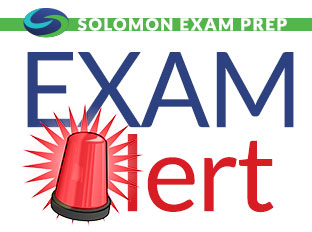This month’s study question from the Solomon Online Exam Simulator question database is now available!
***Submit your answer to info@solomonexamprep.com to be entered to win a $10 Starbucks gift card.***
Question (Relevant to the Series 7, Series 24, Series 55, and Series 62): A market maker has a listed a quote of 32.20 – 32.80, 12 x 7 for ABCD stock on NASDAQ. The market maker accepts a buy limit order from a customer for 200 shares at 32.60. What quote will the market maker have to display to comply with a SEC rules?
Answers:
A. 32.60 – 32.80, 10 x 7
B. 32.20 – 32.80, 12 x 7
C. 32.60 – 32.80, 2 x 7
D. 32.20 – 32.80, 2 x 7
Correct Answer: C. 32.60 – 32.80, 2 x 7
Rationale: The SEC requires market makers to immediately (within 30 seconds) display customer limit orders that are better than their current best quote for NMS stocks. In this case, the buy limit order is better than the market maker’s current bid (32.60 > 32.20) so the market maker must immediately display the adjusted quote.
Congratulations to David A., this month’s Study Question of the Month winner!




